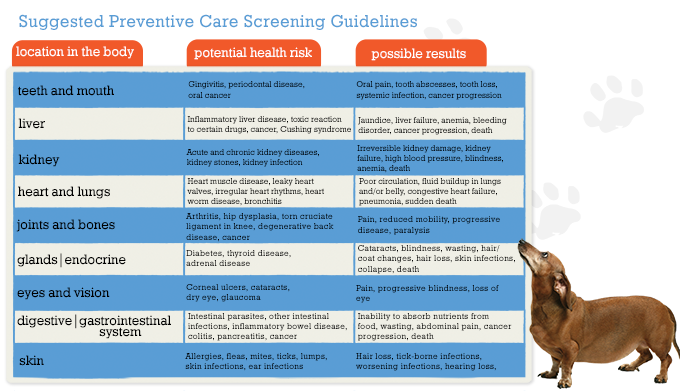We’ve all heard it before – veterinarians urge us to bring our pets in for a checkup once or twice a year, even if they’re in apparently perfect health. This may seem puzzling to some of us. Why should we bring our pets to the veterinarian and pay for a visit if we think our pets are looking and feeling fine?
It’s actually really important to have your pet examined, blood work and all, at least once a year. Why? Think about it: as humans age, checkups become more and more important in order to monitor for conditions that become more common with aging. The same goes for your pet. What’s more, even though your pet may appear healthy, he or she might be sick without you even knowing about it. Pets can’t talk (obviously), so they can’t tell you how they’re feeling. Through instinct, they are also very good a compensating and hiding detectable signs or symptoms of disease from us.
The following is a list of things your veterinarian should check and health risks that can be screened for:
Age Matters
In younger pets, it’s important to get that first veterinary visit under your belt. With a new puppy or kitten, your veterinarian will perform an initial physical exam to look for any signs of illness or disorder, and will perform a variety of other tests to make sure your new pet starts off on the right foot. The pre-anesthetic blood work your veterinarian recommends for your pet before a routine spay or neuter is often the first opportunity to establish baseline laboratory values. It’s important to establish baseline laboratory values – in other words, to determine what’s normal for your pet – so that your veterinarian, in future visits, can detect subtle changes from these established baselines which may be the first indication of developing disease. Early disease detection and prevention is paramount to improve the quality and length of our pets lives. During that first visit, your pet will also be given appropriate vaccines. Be sure to read our New Kitten Checklist and New Puppy Checklist to learn more. And it’s important that younger pets, even those that appear to be in perfect health, have yearly exams.
The same goes for older pets – yearly to twice yearly physical exams and blood tests will allow your veterinarian to look for any deviations in your pet’s baseline laboratory values that may detect early developing disease when it is most treatable. You never know – a slight limp or an abnormal spike in blood glucose could mean your pet is developing conditions such as arthritis or diabetes, two conditions you may not be able to detect on your own. In older pets, your veterinarian will also want to screen for thyroid disorders (hyperthyroidism in cats and hypothyroidism in dogs). For animals with certain clinical signs, radiographs and other imaging studies may lead to the crucial early diagnosis of conditions like heart disease, lung disease, and even cancer
Learn More
Don't believe us? Take a minute to watch our suite of videos in which our very own veterinarians discuss the importance of yearly physical exams and blood work for dogs and cats:
The Importance of a Yearly Physical Exam For Your Dog
The Importance of Blood Work For Your Dog
The Importance of a Yearly Physical Exam For Your Cat
The Importance of Blood Work For Your Cat
The Importance of Annual Veterinary Visits and Preventive Screenings For Your Pet
If you have any questions or concerns, you should always visit or call your veterinarian – they are your best resource to ensure the health and well-being of your pets.
 | Five Questions to Ask Your Veterinarian > Five Tests Every New Pet Should Have > |

